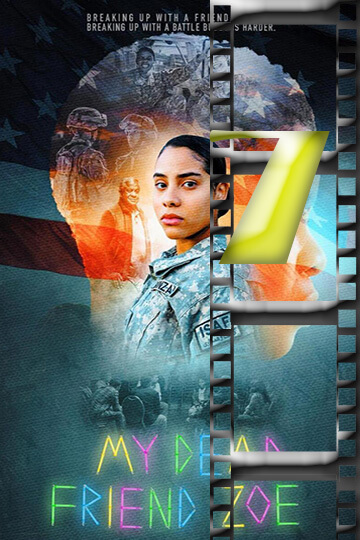



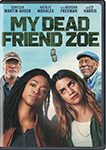
What’s It About
Merit is a U.S. veteran who keeps seeing the presence of Zoe, her best friend who died in combat. When her estranged grandfather is diagnosed with Alzheimer’s disease, she decides to become his caretaker while also trying to heal herself.
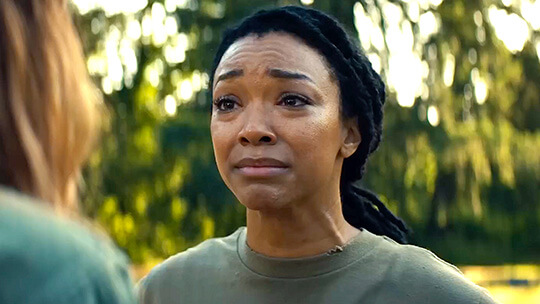
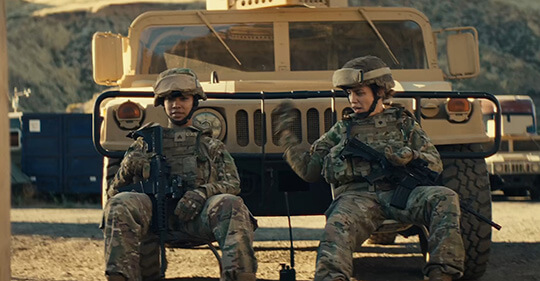
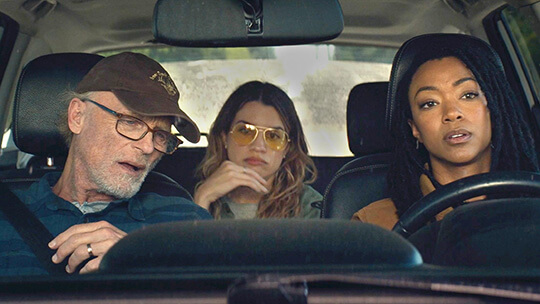
MOVIESinMO REVIEW
In “My Dead Friend Zoe,” we meet Merit Charles, a military veteran struggling to adjust to civilian life. What makes her journey unique is that she’s constantly followed by her dead squad mate, Zoe, who only Merit can see. “The Army doesn’t own PTSD,” Merit tells a date at one point. “We just do it best.” Director Kyle Hausmann-Stokes, a veteran himself, brings authenticity to this story about trauma and healing. The film opens in Afghanistan in 2016, where Merit and Zoe are having lunch. Zoe jokes that if Merit ever finds her in “some dopey group therapy,” she has permission to kill her. Cut to the present, where Merit sits in exactly that kind of therapy group in Oregon, with Zoe’s ghost beside her, making sarcastic comments. Merit faces two main challenges. First, she must come to terms with how Zoe died, a secret the movie holds back until later. Second, she’s been asked by Zoe’s mother to convince Zoe’s grandfather Stan (played by Ed Harris) to move into assisted living as his Alzheimer’s worsens. Merit admires Stan, who inspired her to join the Army, making it painful to watch his mental decline. The therapy group is led by Dr. Cole (Morgan Freeman), a Vietnam veteran who’s been sober since 1978. He refuses to sign off on Merit’s completion papers because she won’t open up in sessions. This isn’t just about healing for Merit. It’s been revealed that she’s only there by court mandate and will be jailed if she doesn’t complete the program. As Merit struggles through these problems, she meets Alex, a guy from the local area who attempts to draw her out of her shell using humor and kindness. Their growing rapport highlights one of the film’s key messages: healing comes through human connection, not isolation. Sonequa Martin-Green is a revelation as Merit, investing both her internal suffering and her gradual opening to the world with conviction. She builds credible chemistry with Natalie Morales (Zoe) and stands her own in scenes with veteran actors Ed Harris and Morgan Freeman. Harris perfects the proud grandfather who won’t admit he’s losing his grip on reality. The movie perfectly balances heavy themes with well-placed humor. Zoe’s ghost doesn’t mind telling it like it is, and Alex brings much-needed comic relief with his free-spirited approach to life. This balance prevents the movie from getting too bogged down despite its heavy themes. “My Dead Friend Zoe” isn’t made from the typical recipe for a brief narrative. While Merit eventually must confront her feelings over Zoe’s passing, the journey there feels organic rather than textbook. The film also looks at family relationships, with Merit’s complicated bond with both Stan and her own mom. Flashbacks are put to good use by the director, illustrating how Merit once was a more lively person when Zoe was alive. These flashbacks to the past provide context to Merit’s current troubles and gradually complete how Zoe perished. Such a moment between then and now. Award merits clearly indicate that graver loss is not without cost to merit. This is further justified across the other elements of the film in the way it deals with issues surrounding PTSD and mental health with seriousness and a human touch. Not limited only to veterans-thought they would find it especially meaningful but to anyone suffering through grief and trauma. This movie is a great reminder that healing happens in community and not in isolation; it empowers sharing one’s story, thus encouraging others to tell theirs. Here and there, there’s a somewhat dragging pace, mostly in the third act where we can all feel glued to the screen because of strong performances and emotional honesty. The film carries its message of human connection without preaching it, subtly showing how important it is to remember that sorrow doesn’t have to be suffered alone. Along with the beautiful natural landscapes that strongly contrast even the increased internal conflict of Merit, the film was shot in Oregon and Los Angeles. This beautiful landscape is exactly opposite the flashbacks from Afghanistan that graphically tie the move from military to civilian life for Merit. Most simply, “My Dead Friend Zoe” recalls coming back to life again following every calamity. It is a reminder that healing isn’t forgetting the dead but learning to bear with them through memory in a way that honors their being and lets us move on. Sometimes, those whom we have lost can, in their absence, become a healing presence for us, if only in our imaginations.
OUR RATING – THERAPEUTIC 7
MEDIA
- Genre – Drama
- Street date
- Digital – March 18, 2025
- DVD – May 13, 2025
- Video – 1080p
- Screen size 2.39:1
- Sound – English: Dolby Digital 5.1, Dolby Digital 2.0
- Subtitles – English SDH, French, Spanish
Extras
- Deleted Scenes
A Veteran’s Story: The Journey Of MDFZ

